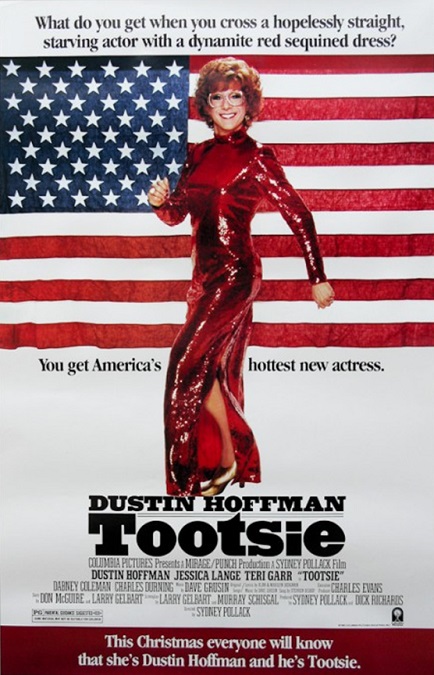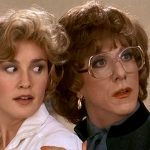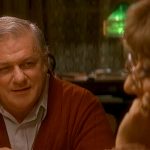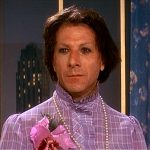
Tootsie – 1982
Suspension of disbelief is the name of the game when it comes to Tootsie. If I didn’t ignore the elephant in the room, I would have never enjoyed the film. Why? Because the whole premise of the movie is that an actor who cannot find work decides to dress as a woman, and when he does, he becomes a successful actress. But nobody in a million years would ever have believed that Dustin Hoffman was a woman.
But I get it. Be that as it may, there wouldn’t have been a movie if the rest of the characters didn’t believe that he was a woman. And at least they made reference to the fact that he was not an attractive woman. In addition to that, the film was not really about the cross-dressing, anyway. I mean, it was, but not really. The movie was a social commentary about sexism and the role of women in society and the work place. It was also a bit of a farce, poking fun at the acting profession, and the challenges of acting in soap operas. The cross-dressing was just the plot device that was used to make those points.
Hoffman played the out of work actor, Michael Dorsey. He, like many actors, is a waiter who also teaches acting. He is egotistical, opinionated, and self-absorbed. He has earned a reputation as an actor who is difficult to work with because he takes his craft too seriously. He believes that he knows how to play a role better than the director, and thus refuses to take direction. For example, a story is told of how he was hired to be a tomato in a commercial, but when the director told him to move, he refused to do it, saying that tomatoes can’t move.
His casual girlfriend, Sandy, played by Teri Garr, is annoying and I often just wanted her to go away. But her character was important because after Michael puts on the dress and the wig and gets a job on a daytime drama, he sees how women are treated. He begins to fall in love with his female costar, Julie, played by Jessica Lang, though she is casually seeing the show’s director, Ron, played by Dabney Coleman. He doesn’t like how Ron treats Julie, but eventually realizes that he is treating Sandy in the very same way.
The movie was a comedy, though none of the actors played it as one. In fact, Hoffman was quoted as saying that he didn’t think the movie was a comedy at all. But funny things did happen. Even Bill Murray, a man famous for his comedic roles, playing Michael’s roommate, Jeff, played his part pretty straight. Maybe it was a little predictable at times because some of the plot elements have all been done before, but things were done in an amusing and more modern way.
For instance, Michael is dressed as his alter ego, Dorothy Michaels, and after an intimate moment with Julie, he tries to kiss her. Julie is shocked and horrified, and begins to believe that Dorothy is a lesbian. Knowing that her father, Les, played by Charles Durning, is in love with Dorothy, Julie tells her that she has to confess her sexuality to him. Some of the comedic dialogue was wonderfully witty, and I imagine it must have been difficult for the actors to spit it all out correctly.
Michael says, “You should have seen the look on her face when she thought I was a lesbian.” To which his agent, George, played by Sidney Pollack, who was also the film’s director and producer, replies, “Lesbian? You just said gay.” “No, no, no,” says Michael. “Sandy thinks I’m gay, Julie thinks I’m a lesbian.” “I thought Dorothy was supposed to be straight.” “Dorothy IS straight. Tonight Les, the sweetest, nicest man in the world asked me to marry him.” “A guy named Les wants YOU to marry him?” “No, no, no – he wants to marry Dorothy.” “Does he know she’s a lesbian?” “Dorothy’s NOT a lesbian.” “I know that. Does HE know that?” “Know WHAT?” “That, er, I… I don’t know.” Very clever.
Tootsie was a good movie because it did a good job of looking at sexism and doing it in a funny way. It had some good acting and some tender, heart-felt moments that weren’t too sappy. And it had some good things to say. I liked that Dorothy’s success as an actress came from her refusal to play the stereotype of a weak-willed woman who allowed herself to be sexualized and victimized by the men around her, both on the soap, and in her personal life. And I liked Michael’s character arc as he, through being a woman, gained a greater understanding and empathy for them. It was a very cleverly written script. Well done, everybody!








